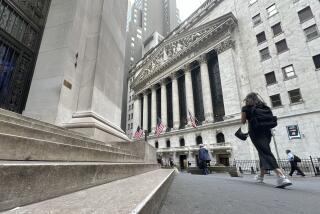Worries About ‘Mad Cow’ Send Stocks Lower
The nation’s first case of “mad cow” disease sent stocks moderately lower Wednesday in a quiet, abbreviated session on Wall Street. A government report that raised concerns about the recovery of the manufacturing sector contributed to the decline.
Food and restaurant stocks were among the big losers, but analysts said it could be several days before the effect of the news was understood. The delay might help limit knee-jerk reactions, said Barry Berman, head trader for Robert W. Baird & Co. in Milwaukee.
“Between the fact that there aren’t a lot of people trading and it’s year-end and things are being done for tax purposes, it’s real tough to make judgments on what kind of effect this is having,” Berman said. “I think people are waiting to see how it carries over into the new year.”
The Dow Jones industrial average closed down 36.07 points, or 0.4%, at 10,305.19, snapping a six-day winning streak. The tech-laden Nasdaq composite index closed down 5.55 points, or 0.3%, at 1,969.23 and the Standard & Poor’s 500 index was down 1.98 points, or 0.2%, at 1,094.04.
With trading ending three hours early, volume was very light. Decliners and advancers were about even on the New York Stock Exchange.
Although Santa Claus was on hand to ring the NYSE’s closing bell, it was a more subdued end to the Christmas Eve session than in years past, when an ebullient Richard Grasso appeared at St. Nick’s side, often in a festive hat. Grasso, the former NYSE chairman and chief executive, resigned in September amid controversy over his $187.5-million compensation package.
U.S. markets are closed today for Christmas, and a half-session is planned Friday. Lighter volume is expected next week because of the New Year’s holiday.
Shares of meat producers and restaurant chains fell after eight nations halted U.S. beef imports on news that a cow at a farm near Yakima, Wash., had tested positive for “mad cow” disease. Fears about the brain-wasting disorder, which can be contracted by people who eat tainted meat, have prompted the massive slaughter of entire herds in Europe.
Among restaurant stocks, Dow member McDonald’s lost $1.32 to $23.96, Wendy’s International closed down $1.87 at $37.79 and Outback Steakhouse fell $2.23 to $42.40. Food processors Tyson Foods dropped $1.08 to $12.90 and ConAgra Foods shed 27 cents to $26.13.
Some firms gained on the news. The nation’s largest egg producer, Cal-Maine Foods, closed up $3.23 at $35.13. Diagnostics equipment maker Bio-Rad Laboratories, a Hercules, Calif.-based firm that has developed a test for “mad cow” disease, surged $10.04, or 20%, to close at $59.82. And Landry’s Restaurants, which owns several seafood dining chains, rose 85 cents to $26.35.
In commodity trading, cattle futures fell the exchange limit on the Chicago Mercantile Exchange. Cattle for February delivery fell 1.5 cents, or 1.7%, to 89.175 cents a pound in light trading. A move of 1.5 cents up or down is the most allowed in a single day under current price conditions at the exchange.
Meanwhile, a report from the Commerce Department showed orders for big-ticket goods from America’s factories had dropped 3.1% in November, the largest decline in more than a year. Economists had forecast a 0.6% rise in the orders for durable goods, which are big-ticket manufactured items expected to last at least three years.
The durable goods data was inconsistent with other recent reports that suggested growing strength in manufacturing.
In another report, the agency said new-home sales had declined 2.4% in November to a seasonally adjusted annual rate of 1.08 million. Even with the decline, economists say new-home sales are on track to set a record high for all of 2003.
Separately, a Labor Department report suggested the pace of layoffs was stabilizing. New claims for unemployment benefits slipped last week by a seasonally adjusted 1,000 to 353,000, in line with expectations.
The dollar sank to a record low against the euro as the overall tepid tone of the economic reports fueled doubts about a robust U.S. economic recovery in the fourth quarter. Negative sentiment emanating from the “mad cow” scare, nagging security fears and thinning market conditions before the Christmas holiday contributed to the dollar’s fall, analysts said.
The euro climbed to a new high of $1.246 from $1.240 Tuesday. The dollar also fell against the yen, closing at 107.28 yen after briefly dipping below its recent three-year low against the Japanese currency.
The reports also gave bond prices a boost as investors bet that anemic economic growth would keep a lid on interest rates. The yield on the benchmark 10-year Treasury note, which moves opposite of its price, slid to 4.19% from Tuesday’s close of 4.26%
Crude oil futures gained on concerns that a terrorist attack might occur during the holiday period. Crude for February delivery rose 91 cents to $32.86 a barrel in New York.
*
Market Roundup, C5-6
More to Read
Inside the business of entertainment
The Wide Shot brings you news, analysis and insights on everything from streaming wars to production — and what it all means for the future.
You may occasionally receive promotional content from the Los Angeles Times.










